| Srl | Item |
| 1 |
ID:
130549
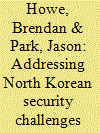

|
|
|
|
|
| Publication |
2014.
|
| Summary/Abstract |
Purpose-Discuss the potential of non-state centric economic cooperation.
Design/methodology/approach-Traditional engagement policies vis-à-vis North Korea have been state-centric, reciprocity-driven and ultimately, unsuccessful. This article proposes the promotion of sustainable, good-faith and meaningful economic exchanges by enrolling the active participation of North Korean elites through alignment with their vested interests.
Findings-Although controversial and even abhorrent from a normative perspective, the approach is eminently pragmatic and necessary to address the limited policy alternatives of an increasingly insecure regime which may eventually be forced to pursue drastic means to ensure its survival.
Practical implications-Non-state-centric international economic engagement is a non-exclusive policy prescription that seeks to broaden the range of viable policy options available to the North Korean regime.
|
|
|
|
|
|
|
|
|
|
|
|
|
|
|
|
| 2 |
ID:
119334
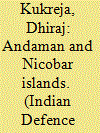

|
|
|
| 3 |
ID:
106707
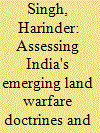

|
|
|
|
|
| Publication |
2011.
|
| Summary/Abstract |
This article attempts to locate and assess the sources of India's land warfare doctrines and capabilities. It begins by briefly examining the Indian army's significant combat experience in dealing with the external and internal security threats during the past six decades. The first section analyzes the security challenges and threats that presently drive the evolution of India's land war-fighting doctrines and capabilities. The next section explains the military imperatives that are driving this doctrinal change. In the next section, the current status of India's land war-fighting capabilities is discussed. The subsequent section examines the institutional limitations that inhibit organizational change, and the final section highlights how these doctrinal and capability gaps might be addressed in the future.
|
|
|
|
|
|
|
|
|
|
|
|
|
|
|
|
| 4 |
ID:
161506
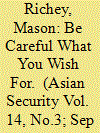

|
|
|
|
|
| Summary/Abstract |
There is a lacuna in the literature analyzing the mid-term (6-24 months) period after a DPRK contingency that results in the Pyongyang regime’s relatively sudden and unmanaged fall. This article helps fill that gap, particularly with respect to security issues that would challenge Korean unification efforts during such a period. Following an Introduction, Section I first makes the case for a DPRK contingency being the most plausible end to the Pyongyang regime. Assuming the scenarios from Section I, Section II addresses the question of what critical issues a unifying Korea will face over the mid-term, and how dealing with these challenges will condition the type of end-state that a unified Korea will embody. In particular we examine three challenges: (a) mid-term security provision related to potential weapons proliferation, cyber-security, organized criminality, and human security; (b) the foundations of institution-building through measures dealing with issues of transitional justice, disputed land title claims, and generating broad domestic stakeholder buy-in in a unifying Korea; (c) the disposition of Korea’s strategic alignment in a Northeast Asia that will have undergone a major alteration of the regional system. Section III concludes with policy recommendations concerning what efforts should be made now to prepare for the situations described in Sections I and II.
|
|
|
|
|
|
|
|
|
|
|
|
|
|
|
|
| 5 |
ID:
190125
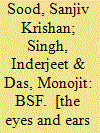

|
|
|
|
|
| Publication |
New Delhi, Adroit Publishers, 2022.
|
| Description |
xix, 281p.hbk
|
| Standard Number |
9788187393788
|
|
|
|
|
|
|
|
|
|
|
|
Copies: C:1/I:1,R:0,Q:0
Circulation
| Accession# | Call# | Current Location | Status | Policy | Location | IssuedTo | DueOn |
| 060349 | 355.3/SOO 060349 | Main | Issued | General | | RF331 | 23-Mar-2024 |
|
|
|
|
| 6 |
ID:
170762
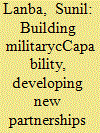

|
|
|
|
|
| Summary/Abstract |
The strategic need for nations to protect and promote their national interest in a changing world order has been the centre piece of global strategic discourse for some time. Linked to this aspect of national interest is the need to build military capability to prepare for the array of security challenges that lie ahead and also developing new partnerships, as the global order shifts from a unipolar model to a multipolar one. There is little dispute over the assertion that the world today is characterised by multi-layered and multi-faceted diversity from political, demographic, economic, environmental and strategic viewpoints. These issues are important from strategic perspective largely because it seems that the world is in another period of historical transition. It would be a fair assumption that we are living through a period of ‘strategic uncertainty
|
|
|
|
|
|
|
|
|
|
|
|
|
|
|
|
| 7 |
ID:
142810
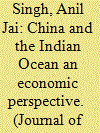

|
|
|
| 8 |
ID:
150942
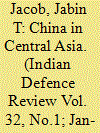

|
|
|
| 9 |
ID:
129909
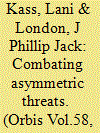

|
|
|
|
|
| Publication |
2014.
|
| Summary/Abstract |
The overarching objective of this analysis is to examine the ways and means by which the United States could take the asymmetric battle-space and win against the ever-changing array of threats posed by nation-states and non-state actors. Today's security challenges are predominantly hybrids: offense and defense; symmetric and asymmetric; synchronous and asynchronous; regular and irregular; geographically-focused and globally-ubiquitous. This reality requires multi-dimensional thinking, nuanced approaches, and nimble, decisive execution guided by a new strategic paradigm. Fighting on the enemy's terms, scoring short-term wins at unjustifiably high costs in lives, treasure and lost opportunities is simply unacceptable.
|
|
|
|
|
|
|
|
|
|
|
|
|
|
|
|
| 10 |
ID:
173110
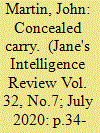

|
|
|
| 11 |
ID:
134107
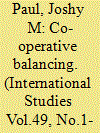

|
|
|
|
|
| Publication |
2014.
|
| Summary/Abstract |
The Asia-Pacific region is facing the threat of a number of potential military conflicts. Unresolved security challenges include the Sino-Japanese and Sino-Indian territorial disputes. The current peace and stability in the region has been achieved through various multilateral mechanisms and constant US involvement in the regional affairs. However, the declining US presence in Asia, the ineffectiveness of different multilateral institutions to establish a security order in the region and China's possible emergence as a great power in Asia may lead to the end of the status quo. In this context, it is pertinent that Asia should be free from both hegemony and power rivalry, and for that, 'co-operative balancing' is the best possible mechanism to achieve a long-term peace and stability. Co-operative balancing is a combination of power balancing and a co-operative security framework. It promotes the independent position of individual countries and strengthens the multilateral mechanisms. This essay concludes that India and Japan can balance against China while bilateral engagement among the three countries tends to reduce their distrust vis-à-vis China.
|
|
|
|
|
|
|
|
|
|
|
|
|
|
|
|
| 12 |
ID:
142798
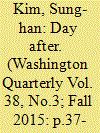

|
|
|
|
|
| Summary/Abstract |
Whenever a North Korean regime “contingency” occurs, it would be the right occasion to seek unification of the Korean peninsula. But some advance peacetime strategy and vision is required to manage the security challenges and divergent priorities of all the major players involved.
|
|
|
|
|
|
|
|
|
|
|
|
|
|
|
|
| 13 |
ID:
150251
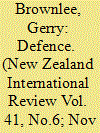

|
|
|
| 14 |
ID:
169686
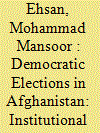

|
|
|
| 15 |
ID:
190933
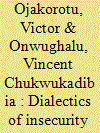

|
|
|
|
|
| Summary/Abstract |
To achieve development in a state of insecurity is a mirage. Africa is caught in this web, as every sub-region faces security challenges. The Millennium Development Goals (MDGs) and the Sustainable Development Goals (SDGs) were developed as frameworks to fast track development in developing countries and sustain it in developed countries through global partnerships. This study is an advocacy to reinvent the role development partners can play to prevent and contain insecurity in the continent. It examines insecurity and development scenarios of countries in Africa, relying on the analysis of secondary data. Based on the triangulation of the Development Partnership Approach and Structural-Functional Approach as the framework for the study analysis, the findings suggest that development partners need to do more to prevent and contain insecurity in the region. The study proposes ways the development partners can achieve these.
|
|
|
|
|
|
|
|
|
|
|
|
|
|
|
|
| 16 |
ID:
149747


|
|
|
|
|
| Summary/Abstract |
A relative oasis of stability in a troubled region, Jordan is nonetheless contending with multiple internal pressures that could yet destabilise it. Mohammed Najib surveys the security challenges facing the kingdom following the 20 September elections.
|
|
|
|
|
|
|
|
|
|
|
|
|
|
|
|
| 17 |
ID:
146506
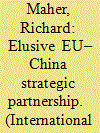

|
|
|
|
|
| Contents |
In 2003 the European Union announced that it had launched a ‘comprehensive strategic partnership’ with China. This policy was intended to elevate EU–China relations beyond prosaic trade and investment issues to address some of the world's most pressing political and security challenges. Anything approaching a comprehensive strategic partnership over the past decade linking the EU and China has failed to materialize, however. This article clarifies and examines those issues that have impeded a closer EU–China alignment, and that hold the greatest potential for future discord in their bilateral relations. It explains how clashing political values, diverging geopolitical interests and priorities, and competing conceptions of world order has limited and will continue to limit the scope and depth of any EU–China strategic relationship. EU–China relations are today, and are likely to remain, contested, uneven and—apart from trade and investment—shallow, and embody a limited rather than a strategic partnership. As China's economic, military and political power continues to expand, the EU will need a new conceptual framework towards Beijing. This framework must be able to facilitate cooperation on issues and policies in which there is real potential for mutual gain, but also manage effectively the inevitable tensions and disagreements that arise.
|
|
|
|
|
|
|
|
|
|
|
|
|
|
|
|
| 18 |
ID:
105459


|
|
|
|
|
| Publication |
2011.
|
| Summary/Abstract |
As of now, institutions within Pakistan are strong enough to prevent both the balkanisation of Pakistan as well as the possibility of the state falling into theocratic hands. Pakistan is also unlikely to wind up terror operations against India as it considers the terrorist organisations to be its strategic assets. Internal disturbances within Pakistan allow it to maintain plausible deniability and the shifting of blame on to non-state actors over whom Pakistan claims it has no control. This paper argues that India's response to terror will have to be well thought out. Waging war against Pakistan to counter its support to terrorist activities within India is not likely to work. It will polarise Pakistani society and push it further into the hands of fundamentalist forces. In any event, the battle to be waged is ideological and peace can never be achieved unless India displays the will to act.
|
|
|
|
|
|
|
|
|
|
|
|
|
|
|
|
| 19 |
ID:
128238
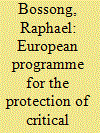

|
|
|
|
|
| Publication |
2014.
|
| Summary/Abstract |
Critical infrastructure protection (CIP) constitutes a paradigmatic as well as challenging case for EU security governance, which has received limited academic attention to date. This article draws on a heuristic framework to survey the EU's capacities to 'meta-govern', that is, to stimulate and steer governance efforts across multiple sectoral and political divides, in this complex issue area. The main part of the paper assesses the European Programme for Critical Infrastructure Protection (EPCIP), which comprises a variety of policy instruments and initiatives, on this basis. It is shown that the attempt of an authoritative regulation of European critical infrastructures has remained narrow and of questionable effectiveness. Scientific networks have developed more dynamically, while the participation of private companies and corresponding EU financial instruments are yet to show their potential. Finally, the EU's organizational capacity in CIP suffers from a lack of coordination structures in the European Commission, but also needs to take the scarcely known Joint Research Centre (JRC) into account. The conclusions highlight the barriers to comprehensive governance of as well as large research gaps on European critical infrastructure policies
|
|
|
|
|
|
|
|
|
|
|
|
|
|
|
|
| 20 |
ID:
129242
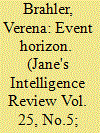

|
|
|